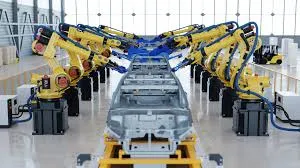Global expansion in the automotive industry has meant a greater necessity for localization services than ever before. Automotive localization involves adjusting products, marketing, and services to respond to the requirements of a particular market. In 2025 and onwards, the sophistication of such services will have to meet the ever-growing diversity of customers and regions.
Let’s look at the top trends in automotive localization shaping the industry going forward:.
1. AI-Powered Localization Tools
In the past, localization required manual effort to adjust content, marketing materials, and even vehicle software for different markets. Now, advanced AI tools are stepping in to streamline these processes. These tools can analyze market trends, customer preferences, and regional nuances to quickly adapt content.
For example, companies like Tesla use AI to customize software and maps based on specific geographic locations. This allows them to offer a more personalized experience, whether it’s language, navigation preferences, or even charging station locations.
2. Expert IT Localization Services for Software Integration
Automotive companies are increasingly relying on sophisticated software to control everything from in-car infotainment systems to advanced driver-assistance systems (ADAS). This means the software must be localized to meet the regulatory and cultural requirements of each region.
Expert IT localization services play a key role here, ensuring that all software works seamlessly across different languages, currencies, and legal standards. For example, BMW leverages IT localization to ensure their iDrive system works smoothly in multiple markets, providing localized features, voice recognition, and more.
3. Cultural Adaptation in Marketing and Communications
Localization isn’t just a matter of translation; it also involves adapting the message to strike a chord in the local culture. In the automobile industry, it is fast catching up as the companies realize that cultural awareness is necessary for marketing.
Take Toyota’s campaign in Japan during the 2020 Olympics. They localized their marketing efforts not just in language but also in values, tapping into the Japanese market’s affinity for innovation, sustainability, and community. This kind of cultural adaptation is something all global automotive brands are focusing on.
4. Localizing Customer Support and Services
Automakers sell more than cars-they sell experiences. Customers in many parts of the world require customer support in local languages. Today, most multinationals invest in multilingual call centers, local language websites, and on-demand customer service via mobile applications.
For instance, Ford has extended its customer service globally with region-specific support through its FordPass app. This app helps customers in other markets find their local dealerships, service centers, and solutions to troubleshooting.
5. Voice and Navigation System Localization
One of the most critical aspects of automotive localization is localizing in-car voice and navigation systems. Since cars are increasingly connected and technologically advanced, drivers expect a seamless experience, tailored to their region.
By 2025, many more automobile companies will have developed localized voice assistants that recognize local accents, dialects, and idioms. Mercedes-Benz has already been experimenting with multi-language voice assistants tailored to accommodate expressions and cultural variations to enhance driving experience.
6. Electric Vehicle (EV) Localization
As the globe is moving to electric vehicles, there is growing demand for specific localization of electric vehicles. Charging infrastructure adaptation along with region-specific marketing campaigns will require the specific needs of different markets to be served by the respective automobile companies.
For example, in China, where electric cars are becoming more popular, NIO and BYD are not only selling cars but also offering a whole ecosystem with localized charging stations, customer support, and even mobile apps customized to the needs of Chinese consumers.
Conclusion
Automotive localization is developing rapidly, with technology at the center of change in the future of the automobile industry. In the quest to expand globally, brands will require the ability to offer a personal, culturally relevant experience. With the adaptation of trends like AI-driven tools, expert IT localization services, and cultural adaptation, automakers will be able to successfully enter new markets and build lasting relationships with consumers across the globe.
These trends will be the definition of the future of automotive localization, making it easier for brands to meet local needs and achieve global success for 2025 and beyond.
Also Read: Part No. 2010xb: amp general point to Characteristics Uses and benefits
